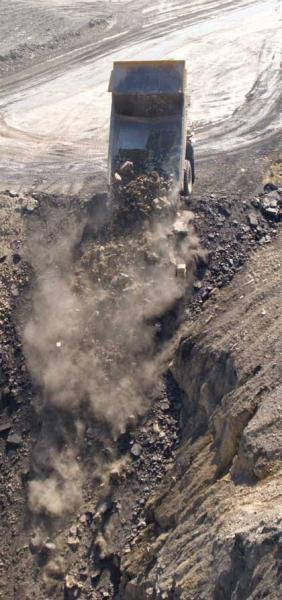Appeals Court agrees: permit used to bury streams with mining wastes not valid
The U.S. Court of Appeals for the Sixth Circuit today invalidated the 2007 version of the nationwide permit used by the U.S. Army Corps of Engineers to authorize the dumping of coal mining wastes into hundreds of miles of Appalachian headwater streams.
The Corps had justified the using the National Permit (NWP 21) based on the "irrational" claim that burying streams with toxic mining wastes had no significant environmental impact.
“I’m thrilled they overturned this decision; it’s a victory for people in eastern Kentucky," said KFTC member Rick Handshoe, a party in the case whose family land in Floyd County is surrounded by mining. "People who live in eastern Kentucky deal with both the immediate and long-term cumulative impacts of mining everyday. Even when the mining is stopped and the coal company is long gone, we deal with the poisoned water and devastated land for decades afterwards.”
 Since 2003, Kentucky and West Virginia residents, with the support of national environmental groups, have been challenging the legality of Nationwide Permit 21 in West Virginia and Kentucky federal courts. A West Virginia federal court enjoined the permit’s use in that state in 2009, but U.S. District Judge David Bunning disagreed with that decision in 2011 and allowed its use in Kentucky to continue. The Sixth Circuit today reversed that Kentucky decision and agreed with the earlier decision by the West Virginia court.
Since 2003, Kentucky and West Virginia residents, with the support of national environmental groups, have been challenging the legality of Nationwide Permit 21 in West Virginia and Kentucky federal courts. A West Virginia federal court enjoined the permit’s use in that state in 2009, but U.S. District Judge David Bunning disagreed with that decision in 2011 and allowed its use in Kentucky to continue. The Sixth Circuit today reversed that Kentucky decision and agreed with the earlier decision by the West Virginia court.
“The Court agreed with us that the Corps failed in 2007 to demonstrate that filling streams with mining waste has minimal cumulative impacts and that the mining companies can mitigate those environmental impacts to insignificance,” said Jim Hecker, Environmental Enforcement Director at Public Justice in Washington, D.C. “This permit should never have been issued, because it was based on the Corps’ unsupportable assumption that filling these streams has minimal environmental effects.”
“This decision has been a long time coming,” added Judy Petersen, executive director of Kentucky Waterways Alliance. “Every year we see the health of rivers and streams in eastern Kentucky declining. In 2010, according to the Kentucky Division of Water, only 1 percent of eastern Kentucky streams fully supported fish and other aquatic life. I’d say that we can see an impact from mining.”
The Clean Water Act only authorizes nationwide permits for stream-filling activities that have minimal environmental effects, both individually and cumulatively. Mountaintop removal coal mining produces enormous quantities of waste that is commonly disposed of in adjacent valleys and streams. Scientific studies have shown that the waters downstream from valley fills are degraded, and there is no scientific evidence that buried headwater streams can be re-created successfully.
The appeals court found that the Corps’ determination that the 2007 NWP 21 would have cumulatively minimal effects was irrational, for two reasons. First, the Corps failed to analyze the present effects of its past actions allowing the filling of hundreds of miles of streams prior to 2007, and instead improperly limited its analysis to the effects of future filling of streams. Second, the Corps had no documented information showing that mitigation could offset the loss of headwater streams at mining sites. Therefore, the court concluded:
After opting for streamlined nationwide permitting, the Corps took the easier path of preparing an environmental assessment instead of an environmental impact statement. Having done so, it needed to follow the applicable CWA and NEPA regulations by documenting its assessment of environmental impacts and examining past impacts, respectively. Failing these regulatory prerequisites, the Corps leaves us with nothing more than its say-so that it meets CWA and NEPA standards. We may not supply a reasoned basis for the agency’s action that the agency itself has not given. We hereby invalidate permit 21 as arbitrary and capricious …
The Sixth Circuit stayed its decision for 60 days to give the lower court and the parties time to assess its impact on existing projects.
While the appeal in the Sixth Circuit was pending, the 2007 NWP 21 expired; but the Corps reissued the NWP in 2012 for five more years with more stringent conditions (namely, a 300-foot limit on filling and a prohibition against valley fills). In reissuing that permit, the Corps created a new loophole that gave about 70 uncompleted projects under the old 2007 NWP 21 five more years to use it without meeting the more stringent conditions of the 2012 NWP 21. That loophole is now likely to be closed. At a minimum, these grandfathered projects will require additional analysis and should have to comply with the more stringent 2012 conditions.
 More broadly, the court’s decision raises serious questions about the Corps’ entire approach to cumulative impacts and compensatory mitigation for coal mining projects. The court directed the Corps to use past mining impacts more carefully to assess cumulative impacts and to document in detail whether mitigation can effectively reduce cumulative impacts. Up to now, the Corps has refused to take these issues seriously and to measure mitigation effectiveness.
More broadly, the court’s decision raises serious questions about the Corps’ entire approach to cumulative impacts and compensatory mitigation for coal mining projects. The court directed the Corps to use past mining impacts more carefully to assess cumulative impacts and to document in detail whether mitigation can effectively reduce cumulative impacts. Up to now, the Corps has refused to take these issues seriously and to measure mitigation effectiveness.
The groups along with KFTC that have challenged NWP 21 in court actions are the Kentucky Waterways Alliance and Kentucky Riverkeeper; and in West Virginia the Ohio Valley Environmental Coalition, Coal River Mountain Watch and Natural Resources Defense Council. The legal team has been led by Jim Hecker at Public Justice in Washington, D.C., assisted by Joe Lovett at Appalachian Mountain Advocates in West Virginia, and Stephen Sanders at the Appalachian Citizens Law Center in Kentucky.
A copy of the ruling is here.
Recent News
Kentucky’s past legislative session showed alarming trend toward government secrecy
Churchill Downs takes more than it gives. That's why the Kentucky Derby is a no-go for me
‘We must never forget.’ Kentucky town installs markers for lynching victims.
Featured Posts
Protecting the Earth
TJC Rolling Out The Vote Tour – a KFTC Reflection Essay
KFTC Voter Empowerment Contractor Reflection Essay
Archives
- Home
- |
- Sitemap
- |
- Get Involved
- |
- Privacy Policy
- |
- Press
- |
- About
- |
- Bill Tracker
- |
- Contact
- |
- Links
- |
- RSS


Add new comment